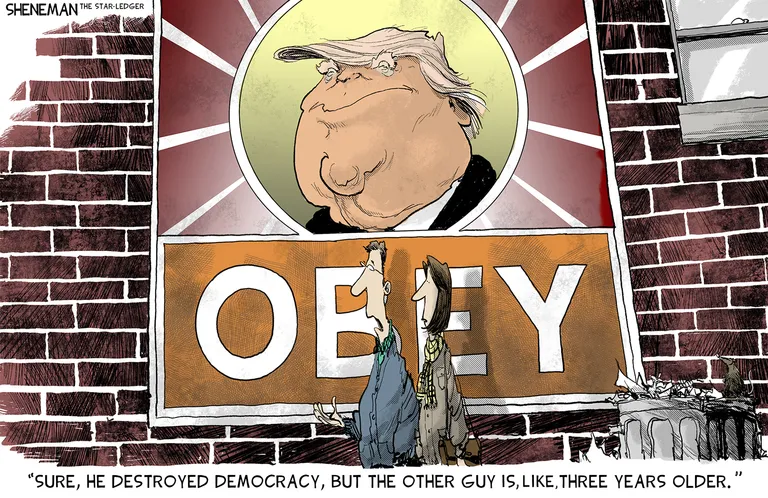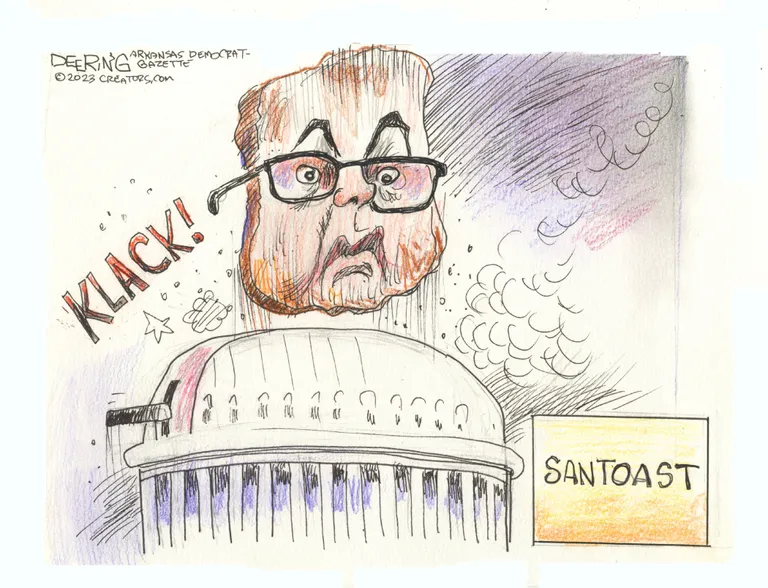|
Accountability vs. Immunity
Defendant's four-year service as Commander in Chief did not bestow on him the divine right of kings to evade the criminal accountability that governs his fellow citizens.
There's no featured post this week.
This week everybody was talking about the war in Gaza
Which is back on. Fighting resumed on Friday morning, with each side blaming the other.
During the seven-day ceasefire, Hamas agreed to release 110 people from Gaza, including 78 Israeli women and children. As part of the deal, 240 Palestinians were also released from Israeli jails. They had been accused of a range of offences, from throwing stones to incitement and attempted murder. … It is estimated that about 140 Israeli hostages remain in captivity in Gaza.
Israel has resumed bombing, and its forces have begun moving into the southern part of Gaza. Hamas is again firing rockets into Israel.
Thursday, the NYT revealed that Israel had the Hamas attack plan for over a year. Israeli officials apparently ignored the plan, which Hamas "followed with shocking precision" on October 7.
The document circulated widely among Israeli military and intelligence leaders, but experts determined that an attack of that scale and ambition was beyond Hamas's capabilities, according to documents and officials.
Josh Marshall adds:
Very recently, ground-level analysts monitoring video surveillance of activity in Gaza saw evidence that Hamas was war-gaming and running drills for attacks that looked like components of Jericho Wall. One analyst repeatedly pressed the issue with higher-ups, but her effort to raise the alarm was again disregarded.
His column doesn't identify a source for that information.
Politically in the US, the Gaza War has been bad for Biden, but not for the reason a lot of people think. He is undoubtedly losing votes on the left for being too pro-Israel, but he would probably lose more votes if he were more critical of Israel. ("Biden is siding with the terrorists!")
Biden will lose votes whatever he does, because Israel/Palestine is a wedge issue that splits Democrats, but not Republicans. Republicans would probably be happy with anything Israel did, even to the point of an actual genocide. (Aside: Whatever you think of Israel's treatment of Palestinians, it's not genocide. Genocide is too important a word to ruin through misuse.)
Similarly, the Ukraine War is a wedge issue that splits Republicans, but not Democrats. Democrats are united behind Ukraine. Meanwhile Putin remains a hero to many MAGA Republicans, even as establishment Republicans agree with Democrats in supporting Ukraine.
I know it's too much to expect that people will take a step back and think rationally about an issue, but if they did, they'd see that the Gaza War validates a liberal rather than conservative view of how to maintain peace. In its simplest form, the conservative idea is peace-through-strength: If we're strong enough and tough enough, no one will attack us because they'll know they will suffer more than we will.
The liberal vision is peace-through-justice: If everyone is getting a square deal, they won't want to risk it by going to war.
In their purest forms, both visions are naive; real peace requires both strength and justice. But I think liberals understand that, while I don't think conservatives do. The Hamas attack exposed the folly of the Netanyahu peace-through-strength policy. If people feel aggrieved enough, they won't care that a war will hurt them more than you. They'll risk their lives to bite your ankle.
and the Trump trials

Trump' claims of presidential immunity were denied by two different D. C. federal courts Friday. A three-judge panel of the D.C. Court of Appeals rejected his motion to dismiss a civil lawsuit filed by two U.S. Capitol police officers and several Democratic lawmakers against Trump and a few other individuals and groups they want held responsible for the January 6 violence. And District Judge Tanya Chutkan rejected his motion to dismiss Jack Smith's election interference indictment.
Nothing in the Constitution explicitly immunizes a current or former president from legal processes. However, certain kinds of immunity have been recognized by the courts: Presidents are immune from lawsuits against the consequences of carrying out their duties. And longstanding DoJ policy, based on a memo by its Office of Legal Counsel, says that a sitting president can't be indicted. (That doctrine has never been tested in court.) And courts have recognized a vague principle that at some point, legal harassment of a president might reach the point that it violates the separation of powers between the executive and judicial branches of government.
In his motions, Trump was asking the courts to expand that immunity to vast proportions. His arguments were slapped down in both cases.
Both motions were for dismissing the cases without a trial. Dismissal motions have to clear a very high bar, because they're claiming that a trial can't possibly reveal anything that would matter. So the judge has to assume that the claims made by the prosecutors or plaintiffs are true, and conclude that no penalty would apply anyway.
The appeals court ruled that the civil case against Trump needs to go forward, because it's not obvious that Trump's actions related to the January 6 riot were part of his job.
The President, though, does not spend every minute of every day exercising official responsibilities. And when he acts outside the functions of his office, he does not continue to enjoy immunity from damages liability just because he happens to be the President.
This kind of compartmentalization has never registered with Trump. In his mind, there was no separation between his person and his presidency. If the president had some power, then he had that power, to wield as he saw fit, independent of whether he was carrying out some official duty.
Judge Chutkan ruled similarly: Committing crimes is not part of a president's job, so crimes allegedly committed while in office can be prosecuted. (Whether those crimes were or were not committed should be decided at trial.) And she need not settle the presidential-indictment question here, because Trump is not president.
Whatever immunities a sitting President may enjoy, the United States has only one Chief Executive at a time, and that position does not confer a lifelong "get-out-of-jail-free" pass. Former Presidents enjoy no special conditions on their federal criminal liability. Defendant may be subject to federal investigation, indictment, prosecution, conviction, and punishment for any criminal acts undertaken while in office
Chutkan also denied a motion claiming that the Smith indictment should be dismissed because it criminalizes speech protected by the First Amendment.
[I]t is well established that the First Amendment does not protect speech that is used as an instrument of a crime, and consequently the Indictment—which charges Defendant with, among other things, making statements in furtherance of a crime—does not violate Defendant's First
Amendment rights.
The question of whether Trump's false claims about the 2020 election were part of a criminal plot has to be decided at trial.
While Defendant challenges that allegation in his Motion, and may do so at trial, his claim that his belief was reasonable does not implicate the First Amendment. If the Government cannot prove beyond a reasonable doubt at trial that Defendant knowingly made false statements, he will not be convicted; that would not mean the Indictment violated the First Amendment.
Meanwhile, there are the gag orders. WaPo keeps track of which ones are active: Judge Chutkan's order preventing Trump from disparaging prosecutors, witnesses and court personnel involved in his trial is suspended while the appellate court considers it. They might rule any day now.
Judge Engoron's order preventing Trump from attacking court personnel is currently in force as an appeals court evaluates it.

After normalizing Trump for many years, many voices in the mainstream media finally seems to be acknowledging his threat to America's constitutional democracy. Thursday, WaPo editor-at-large Robert Kagan published "A Trump dictatorship is increasingly inevitable. We should stop pretending."
Today's NYT has an article "Why a Second Trump Presidency May Be More Radical than His First". The authors note that Trump has always had "autocratic impulses", dating back to his praise of the Chinese massacre of the Tiananmen Square demonstrators, and reflected in his admiration for autocrats like Saddam Hussein or the Philippines' Rodrigo Duterte, not to mention Vladimir Putin and Xi Jinping.
What would be different in a second Trump administration is not so much his character as his surroundings. Forces that somewhat contained his autocratic tendencies in his first term — staff members who saw their job as sometimes restraining him, a few congressional Republicans episodically willing to criticize or oppose him, a partisan balance on the Supreme Court that occasionally ruled against him — would all be weaker.
Princeton Professor Jan-Werner Müller has a similar article in The Guardian. He observes that establishment-Republican institutions like the Heritage Foundation are now on board with a Trump autocracy.
Trump is not hiding anything; nor does a figure like the Heritage president, who considers Hungary "not just a model for conservative statecraft, but the model".
Liz Cheney's book Oath and Honor comes out this week. Early reports portray it as an insider's view of how the Republican Party officials caved in to Trump, even as they criticized and even laughed at him privately.
and Elon's breakdown
Elon Musk is further gone than I thought. In an interview Wednesday at the NYT DealBook summit, he told companies who have responded to his antisemitic tweets by pulling their ads from X to "Go fuck yourself."
If someone is going to try to blackmail me with advertising, blackmail me with money, go fuck yourself. GO. FUCK. YOUR. SELF.
You can watch the video. He clearly expected the audience to applaud his courageous stance, but instead there was a stunned silence. The interviewer (Andrew Ross Sorkin) then asked about "the economics of X", which relies on advertising revenue to survive. And Elon responded:
What this advertising boycott is going to do, it's going to kill the company. … And the whole world will know that those advertisers killed the company. We'll document it in great detail.
When Sorkin explained how the advertisers would justify themselves, Musk countered:
Tell it to Earth. … Let's see how Earth responds to that.
Elon seems convinced that he is the hero of this story, and that the People of Earth will frame events the way he does. How dare companies like Disney choose to spend their advertising dollars somewhere else? How dare they decide that displaying a trailer for "Wish" next to some white supremacist rant doesn't serve their purposes? The People of Earth are so attached to the X platform and so enamored of Elon himself that they will make Disney pay for such arrogance.
Unsurprisingly, advertisers did not flock back to X after Musk's threat to expose them to "Earth".

Three things are worth pointing out here: First, Musk's attempt to turn this into a free-speech issue falls flat. Sure: Antisemites, racists, misogynists, and even outright swastika-waving Nazis have a right to speak their minds and try to make converts. But they are not entitled to have someone else sponsor a platform for them.
And second, I see Elon's stewardship of X as part of what Cory Doctorow calls "the Great Enshittening" of the internet. I would gladly spend my X-time elsewhere if some alternative platform achieved a critical mass of users, and I welcome X's looming demise because it might create space for something better to emerge.
As for Musk himself, I see him as the kind of tragic figure Aeschylus would have found fascinating. Like the Trump saga, Elon's story demonstrates that being worshiped is bad for mortals. Almost no humans have enough strength of character to stay sane once they've been surrounded by a cadre of worshipers the way Elon has.
One of the things I admire most about Barack Obama is that he has shown the good sense to keep our admiration at arm's length.
and the Biden economy
GDP growth after inflation was 5.2% in the third quarter, which is a stunning number. At its peak in the third quarter of 2019, the Trump economy posted 4.6% growth.
The US economy continues to lead the G7 countries.

The inflation rate is now lower than when Biden took office.
And what about the claim that Biden has been bad for US oil production?

The continuing good economic news contrasts with the public view that the economy is in bad shape. David Roberts refers to this as the "vibes" problem, which Democrats have to get better at addressing.
Substantive accomplishments — even the ones the public says on polls they want/like — are not enough, in & of themselves, to win political approval. They don't advertise themselves or tell their own story. The channels through which the public has traditionally been informed about political accomplishments have become fragmented, polluted, and dominated by lavishly funded right wingers. They can't be relied on. … In other words, Dems are winning the war of substance but losing the vibes war, largely because they don't seem to realize that those two fights have drifted almost entirely apart.
and you also might be interested in …

Henry Kissinger died at 100, inspiring obituaries like "Henry Kissinger, War Criminal Beloved by America's Ruling Class, Finally Dies". Vietnam, Cambodia, Indonesia, Chile … if you live long enough, all your crimes start to sound like ancient history.
But what I had thought was Kissinger's most lasting contribution to American culture turns out not to be true: He wasn't the model for Dr. Strangelove.
It is frequently claimed the character was based on Henry Kissinger, but Kubrick and Sellers denied this; Sellers said: "Strangelove was never modeled after Kissinger—that's a popular misconception. It was always Wernher von Braun." Furthermore, Henry Kissinger points out in his memoirs that at the time of the writing of Dr. Strangelove, he was a little-known academic.
Sandra Day O'Connor also died. The first woman to serve on the Supreme Court, she lived to be 93. Appointed by Ronald Reagan, she was the kind of conservative justice that today's conservatives abhor. She wasn't driven by ideology. Instead, the facts of the case mattered to her, and you couldn't predict her vote without examining them. Politico summarizes:
[H]er decisions and her reasoning demonstrated a constant attention to the proper role of the Supreme Court as a nonpartisan arbiter of hot-button issues in American life, to the actual facts about the actual parties, and to the way in which the bench's rulings would be experienced by the American public. … The strategy of the Roberts Court, however, has been strikingly different.
Republicans have begun talking about having a health care plan again. I say "again" not because they have had a health care plan in the past, but because they talk about having a plan every now and then.
Back in 2015 Trump promised a "terrific", "phenomenal", and "fantastic" system to replace ObamaCare. But once in office, he left the details to Republicans in Congress, who never united around any particular proposal. Their slogan of "repeal and replace" was always light on the "replace" side. When John McCain delivered the final vote needed to save ObamaCare in 2017, his office's statement said:
While the amendment would have repealed some of Obamacare's most burdensome regulations, it offered no replacement to actually reform our health care system and deliver affordable, quality health care to our citizens.
Nothing has changed in the last six years. Trump is now talking again about repealing ObamaCare.
Trump's campaign is drawing up a health care proposal, although it is unclear when that will be released or if it will propose a full replacement plan (Republicans have struggled to put one together for years).
Not to be outdone, Ron DeSantis is also talking about a health care plan.
We need to have a health care plan that works," he said when asked whether he will repeal and replace ObamaCare. "ObamaCare hasn't worked. We are going to replace and supersede with a better — better plan."
DeSantis said details of the plan will likely be worked out in the spring and that his campaign would "roll out a big proposal."
By spring, of course, DeSantis will be an ex-candidate and whatever proposal he might have come out with will be moot.
The basic conservative health-care problem is that market competition will never deliver a good health insurance system. There's a simple reason for that: The way to make money in health insurance isn't to deliver quality care at an affordable price. Instead, the path to high profits is to insure people who don't get sick, and to encourage people who likely will get sick to insure with somebody else. The less government regulation a system has, the more this market imperative will assert itself.
Almost no other market works this way. For example, if you're a car company, there's no group of consumers that you hope doesn't buy your car.
Sports Illustrated got nailed for apparently letting AI write articles and then crediting them to fake reporters with AI-generated photos.
What's weird to me is the deception. I mean, why not be up-front about it? There's nothing inherently immoral about letting ChatGPT write an article if you then fact-check, edit, and take responsibility for it. I have no plans to produce Sift articles that way, but if I did, I wouldn't be ashamed to admit it. (I'm trying to inform people and promote my point of view rather than validate some claim about my abilities.)
In high school I worked for my local newspaper, and occasionally my job involved writing intro paragraphs for box scores of minor sporting events we hadn't sent a reporter to: "Joe Blow scored 23 points to lead West Nowhere High to a 79-53 rout of its crosstown rival East Nowhere." I was essentially doing the work of an AI: not reporting anything new, but applying common narrative templates to information already in the box score.
In the WaPo, Josh Tyrangiel takes a similar view: He used to work at Bloomberg, which quickly processed company earnings reports to produce headlines that its subscribers would trade on. But rapidly searching through numbers to find the most significant ones is something computers do better than humans.
Bloomberg shifted to automated earnings headlines in 2013 and has used AI to create its earnings summaries since 2018. It also employs more journalists and analysts now than it did back then — some 2,700, all of whom get to do more interesting work than writing earnings headlines and summaries.

As expected, George Santos was expelled from the House of Representatives. What's surprising is the 114 votes not to expel him.
More evidence how out-of-it I am: The word of the year is "rizz", which I had never heard of until I read the article. Reportedly, it is Gen Z slang for "a person's ability to attract a romantic partner through style, charm or attractiveness".
If you're one of those people who does the bulk of your charity giving at the end of the year, consider the Wikimedia Foundation, which supports the Wikipedia. It doesn't have any poster children or sad animals to show you, but Wikipedia has become central to our basic information infrastructure. I rely on it constantly for historical information, and it actually isn't a bad way to keep track of evolving news stories, like natural disasters and mass shootings. Typically, the first reports in the media aren't terribly accurate, and over a period of days it can be hard to sort out what was rumor and what is still considered reliable. Wikipedia collects and curates that stuff.
and let's close with a visual pun
The artist Gustav Klimt had a very distinctive style, as you can see from one of his most famous works: The Woman in Gold.
The similarity in names inspired Carl Tétreault to produce this image of The Man With No Name: "Klimt Eastwood".
|




No comments:
Post a Comment